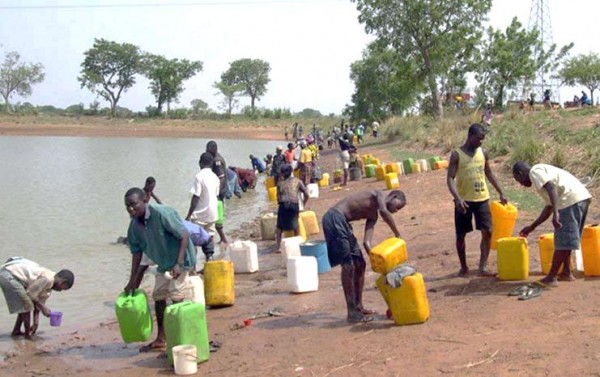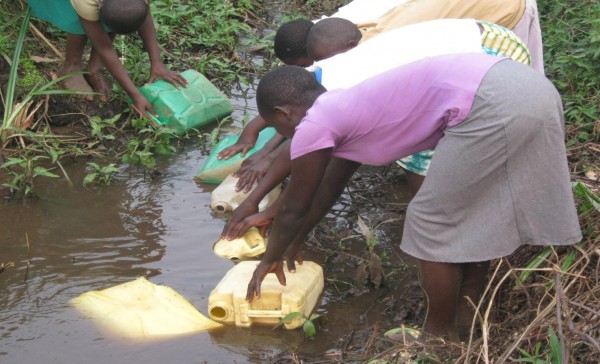
Rural dwellers fetching water from a local lake in Northern Ghana. Photo: Izumi Kikkawa
The United Nations has set aside 22nd March of every year as World Water Day. This is a day that is celebrated around the world to draw attention to water related issues. This year, the theme for the event was “Water and Sustainable Development”, a topic carefully chosen to highlight on how water links to all dimensions that are needed to create the future we want. The day drew a lot of attention to the importance of water to health, environment, industries, energy, food and equality.
Undoubtedly, addressing water related issues will require more than a day as water is critical to the health of every nation and its socioeconomic development. Unavailability of clean water and poor sanitation are frequently associated with high incidence of water-related diseases including cholera. For a continent like Africa, the day provided among other things an opportunity to re-think the challenging task of halting pollution of water resources across the continent. The warming climate and human activities including population growth, urbanisation, industrial activities, poor farming practices and more especially poor waste management practices continue to impact negatively on water resources.
Some Statistics
Though the African continent is said to be endowed with about 63 spectacular international trans-boundary river basins that cover 64 percent of the continent’s land, Sub-Saharan Africa is reported to have the lowest daily household per capita water use in the world, a consumption rate that is far below the UN minimum domestic consumption level of 50 litres per day.
Source: World Water Council
It is even more alarming when a UN water report (2015) revealed that the percentage of people who enjoyed piped-borne water on their premises in Sub-Saharan Africa has actually decreased from 42% to 34%, a clear indication that access to “safe” drinking water sources is also declining. In fact, the challenge in the region is not only with water accessibility but even when water is available there are risks of contamination due to pollution and poor sanitation. Infrastructure to channel water from fresh and clean water sources for use at arid areas often remains costly for many communities.
As freshwater sources constantly get polluted, so are consumers left with no choice than to depend on the untreated water for domestic use and other purposes, a situation that poses serious health concerns. Sadly enough is to see women and young girls who are the major actors in accessing and carrying water, having to suffer more as the situation prevents them from engaging in more income-generating activities or attending school regularly; as most times of their day is spent on walking miles for their daily water needs. This therefore calls for a revolution against water pollution in the continent.
Girls in search of water. Photo: Fredrick Mugira
Some Experts Solutions
Expressing his thoughts on how to address the water pollution issue across the African continent, Dr Elias Ayuk, Director of the United Nations University Institute for Natural Resources in Africa (UNU-INRA) noted that considerable investments are required to increase access to clean water and to improve sanitation and waste management in many developing world including Africa.
“There is the need to give more priorities to water resources management in most Sub-Saharan African (SSA) countries. It is estimated that only about 3% of Africa’s renewable water resources have been tapped. Opportunities therefore exist for tapping and harvesting more water for irrigation, domestic and industrial use, if the appropriate investments and regulatory frameworks are put in place”, stated Dr Ayuk.
Girls in search of water. Photo: Fredrick Mugira
In the view of Dr Effiom Oku, Land and Water Resources Research Fellow at UNU-INRA, increased knowledge in innovative science and technology research is the sure way to go. He observed that “science and technology are the obvious means of changing the trajectories for harnessing Africa’s water resources so as to create wealth, produce enough food and reduce poverty”. He reiterated the need for the continent to explore cost effective technologies to treat wastewater for reuse and invest in more advanced technologies such as reverse osmosis for desalination, in order to address the water challenges in the continent.
There is no doubt that water resources management must be prioritised to drive sustainable development. Africa indeed needs a behavioural change on the part of its citizens to halt water pollution. This will require citizens to resist from dumping wastes and excreta into drainages and water resources, so as to prevent water pollution. Mining firms and other organisations, whose activities affect water bodies and the environment in general, should also take pragmatic measures to mitigate the impact of their operations on the ecosystem and people. Proper sanitation practices, implementation of appropriate regulatory frameworks to minimise the impact of industries’ operations on the environment and strong leadership commitment in protecting water resources will contribute to finding lasting solutions to clean water and water accessibility challenges across the continent.
This article is written by Praise Nutakor, Communications and PR Associate of UNU-INRA




